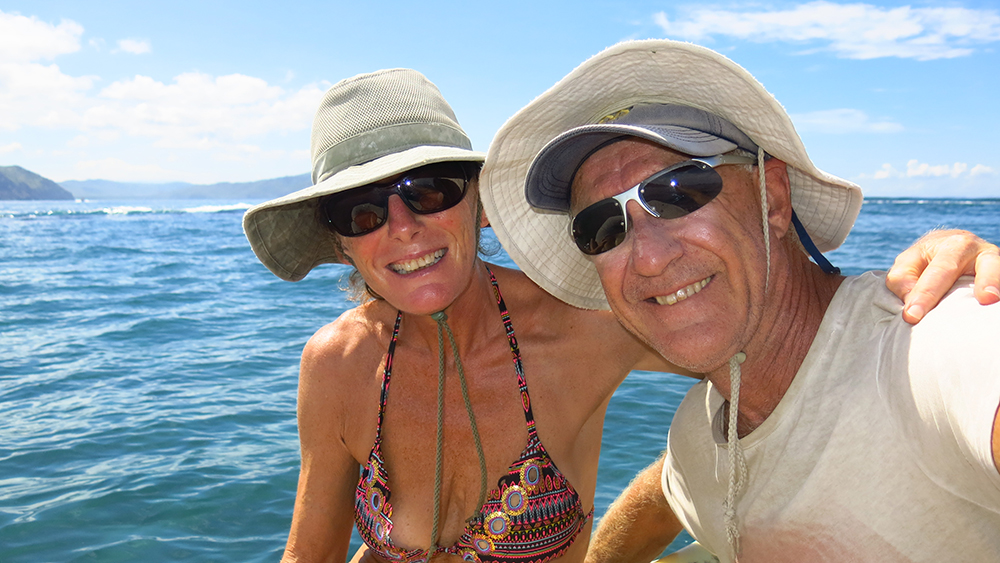
Surfing at the Island, Isla Colarada
Our first port of call in Costa Rica was Bahia Santa Elena, an almost landlocked bay on the south side of Golfo de Papaygayo and just a day sail from Nicaragua. Wedropped anchor and were just settling in for sundowners when we were engulfed by a swarm of flying ants. We couldn’t close the portlights and hatches fast enough, before we knew it they were everywhere; in all the cupbboards, in our drinks, in our hair. What makes these critters particularly malevolent is that they shed their wings so they can crawl through fly screens and into the tiniest crevice, a month later we are still finding wings in various nooks and crannies.
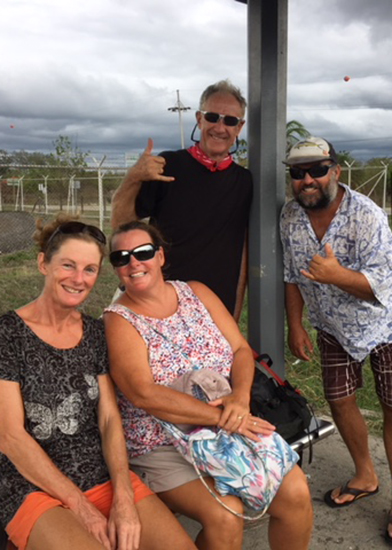
Waiting with the Xenia crew for a bus back from checking in with Customs at the airport
We arrived in Playas de Coco with our friends Tara and Mike on Xenia and had to complete all the formalities for entering Costa Rica. This involved a visit to the Port Captain then Immigration, then back to the Port Captain then a bus ride out to the airport to the Customs Office. It all takes plenty of time, plenty of smiles and plenty of copies of various documents to keep things moving. Anyway it was all completed in a day with plenty of time to get back to Playas de Coco for happy hour.
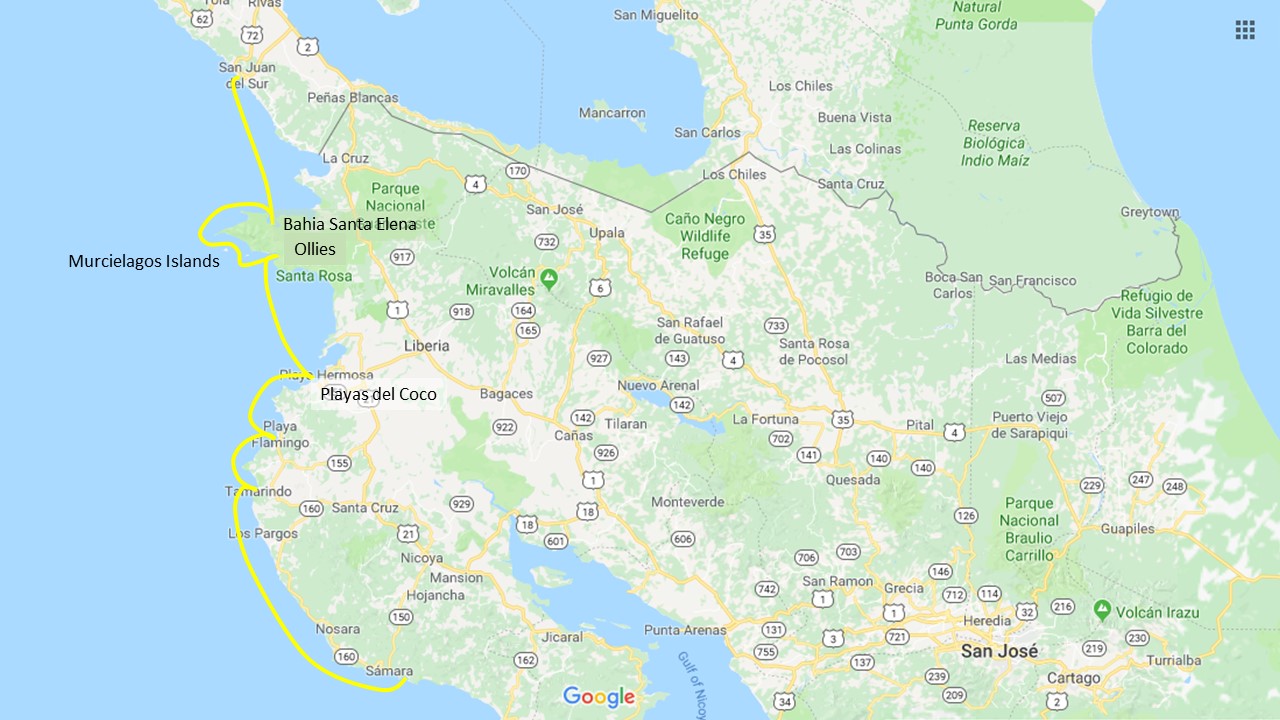
The Pacific coast of Northern Costa Rica is known as the Gold Coast because droves of Americanos have moved down here looking for a tropical retirement, Nirvana or an escape from Trump. Consequently the price of property and everything else has shot up and many of the easily accessible bays are crowded with tourists and local gringos. With them they bring many useful things like supermarkets and ATMs (and happy hour!) and there are still dozens of remote islands and empty coves which we can explore in Distant Drummer. Pura Vida! – as they say over here.
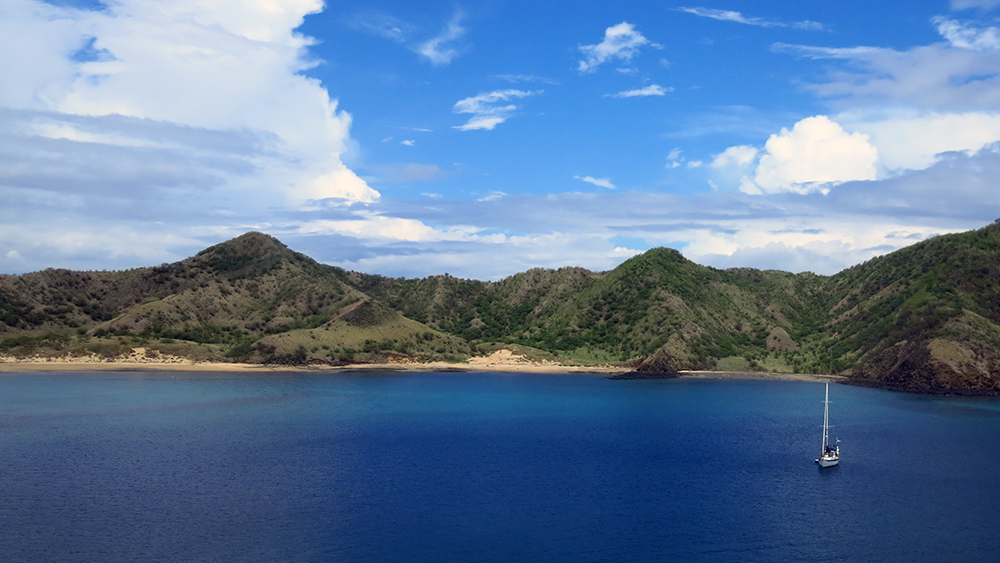
Distant Drummer in the beautiful bay at Islas Murcielagos
We spent two weeks pottering around the Guanaste coast and I think our favorite spot was the Murcielagos Islands. They are only about 20NM out of Playas de Coco but are part of the Santa Rosa National Park so are completely undeveloped and fishing is prohibited. We anchored in a truly idyllic bay sheltered from everything the weather could throw at us, in super clear water heated to a pleasant 29oC by brilliant sunshine. Aahh – Pura Vida! We enjoyed snorkelling on the rocky reef (we’ve still yet to find good coral in Pacific Central America) and the reef fish were colourful, inquisitive anad fun.
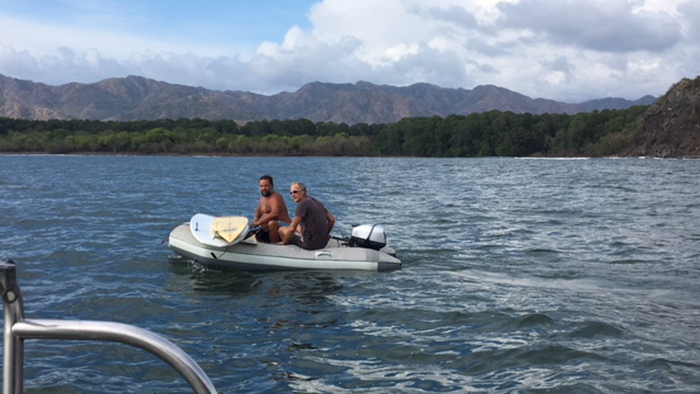
Neil and Mike from Xenia going surfing at Ollies (photo xeniadreaming.com)
Neil’s been doing a bit of surfing. First time out was at Ollies in Bahia Potrero Grande where we anchored for a night with Xenia. The surfing didn’t work out too good but the bay has an interesting history. Back in 1856 the Costa Rican army fought and ejected William Walter, a crazy American mercenary who had already invaded Nicaragua and elected himself president. Just to the north of the bay is the airstrip from which Oliver North supported the Nicaraguan Contras via arms sales to Iran in 1986 – the surf break was named after him.
Neil also surfed at the Island, a sand spit at the eastern end of Colarada Island where the surf breaks in both directions. It can only be surfed at low tide because at higher tides the waves break into one another and it’s white frothy pounding breaker chaos. Luckily we had a heads up from a local guy and Neil enjoyed a couple of waves.
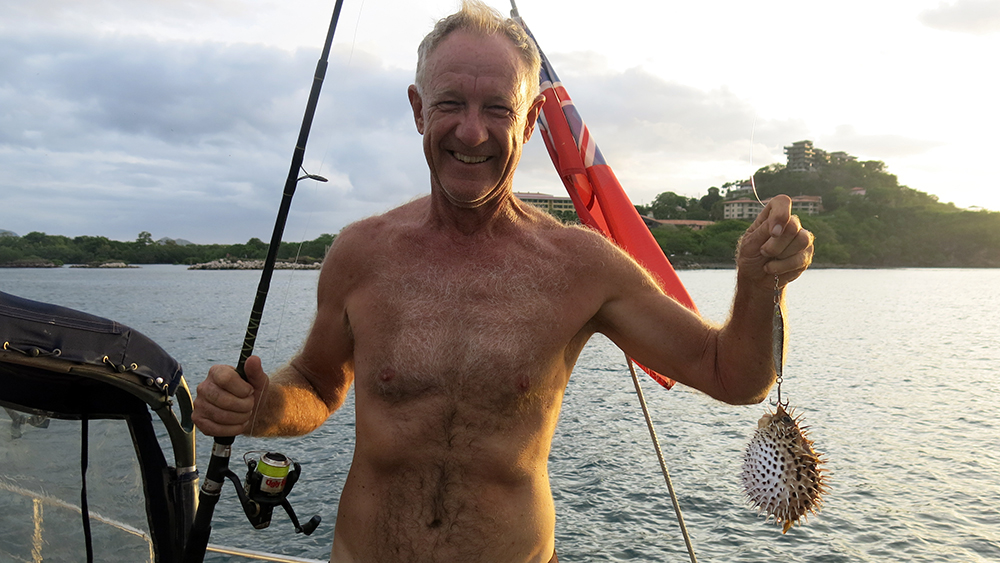
Think we’ll throw the puffer fish back Neil!
We’ve been doing a bit of fishing (outside of the National Park I hasten to add) with varied success. While we were close to the coast Neil was fishing with a rod and catching only puffer fish which inflate with water as soon as they feel the hook. They are funny too look at but not very appetizing, except to the Japanese, so we threw them back. Since getting into deeper water we have caught masses of Mahi Mahi, a beautiful fish which is also very good to eat. At this time of year the Mahi are very small so we’ve released almost all of them, just one made it to the table.
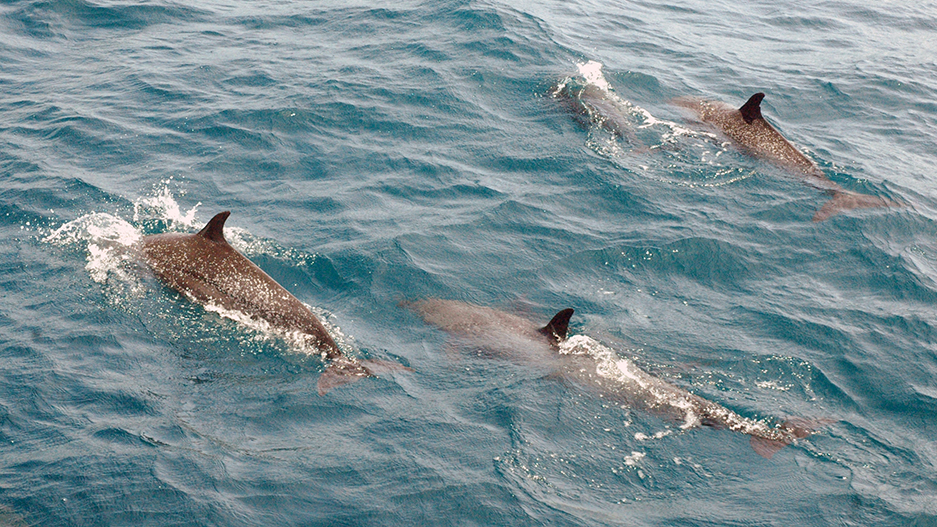
Surrounded by dolphins
After reprovisioning in Playas de Coco we headed south to Golfo de Nicoya. The passage around the Nicoya Penninsula has a few spots to anchor so we could make the journey in day hops but all the anchorages are open to the SW swell and rolly at this time of year. We stopped at Tamarindo (or Tamagringo as the locals call it!) and then hopped down to Samara where we experienced an almighty storm.
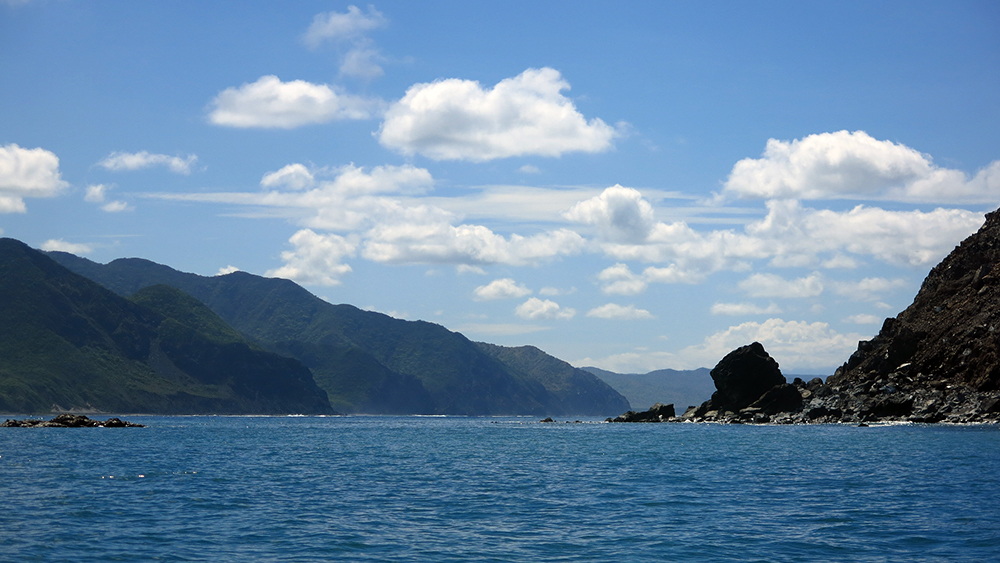
Dramatic coastal scenery at Isla Colarada
Lightening is a constant fear in the wet season in the tropics and sitting in a boat in the water with a 65’ metal pole poking up into the sky is not the best place to be during a thunderstorm. Mostly we sit and watch them from the back deck, flashing and growling over the coastal hills but the one in Samara was right on top of us.
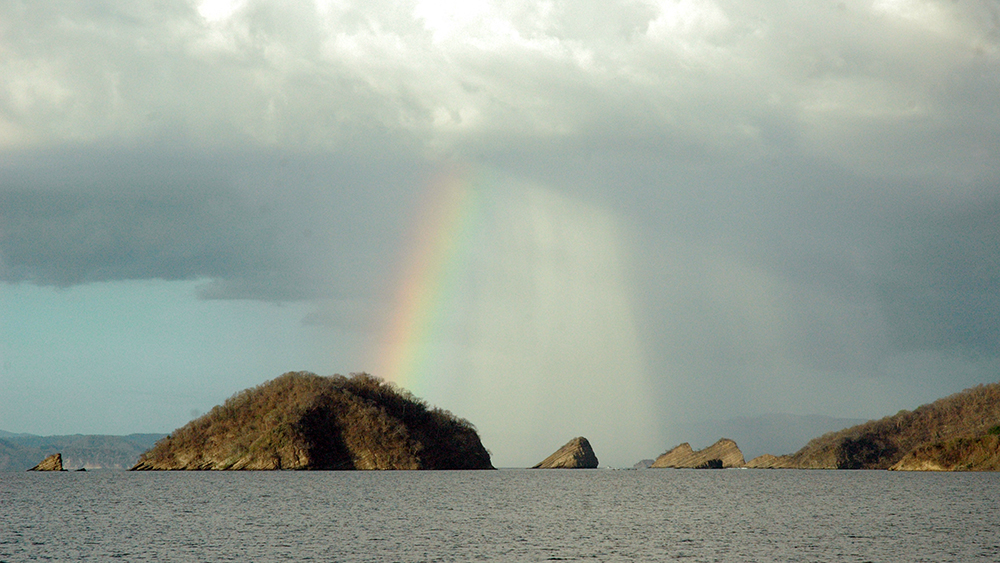
This is the cutest little storm, it looks just like a weather forecast!
It started about 4am with a light patter of rain. I got up to close the hatch, unplug the computers and put our essential electronics (GPS, phones, VHF) in to the oven to protect them from a lightning strike. Then I went back to bed. Soon the rain was drumming on the deck above our heads and huge drops were plopping in the water just outside our bed. As the wind picked up the boat was rolling a bit in the choppy sea and thunder was rumbling in the distance, but once the storm was right overhead the wind dropped and the sea became calm.
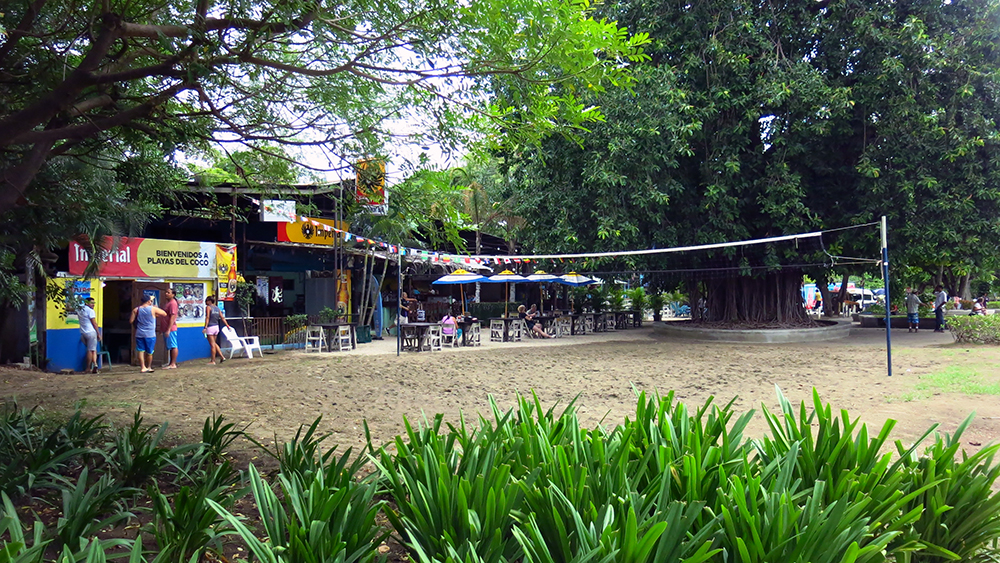
Playas del Coco is very laid back but very touristy
We lay in bed listening to the storm trying to count the seconds between lightning and thunder but they were almost simultaneous. Through the portlight I watched as brilliant forks of lightning irradiated the clouds, followed immediately by almighty claps of thunder. It’s amazing how something as light and wafty as air can create such ashatteringly loud, sharp crack, like the sound of a rock face fracturing in an earthquake. Each clap felt like something huge had broken. Eventually the storm lumbered off but the rain didn’t stop all day.
Now we have made it to the Golfo de Nicoya – more soon.
Suzy
